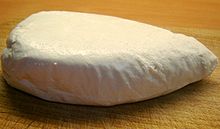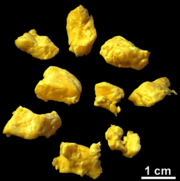- Curd
-
Curds are a dairy product obtained by curdling (coagulating) milk with rennet or an edible acidic substance such as lemon juice or vinegar, and then draining off the liquid portion. The increased acidity causes the milk proteins (casein) to tangle into solid masses, or curds. The remaining liquid, which contains only whey proteins, is the whey. In cow's milk, 80% of the proteins are caseins. Milk that has been left to sour (raw milk alone or pasteurized milk with added lactic acid bacteria or yeast) will also naturally produce curds, and sour milk cheese is produced this way.
Contents
Uses
Curd products vary by region and include cottage cheese, quark (both curdled by bacteria and sometimes also rennet) and paneer (curdled with lemon juice). The word can also refer to a non-dairy substance of similar appearance or consistency, though in these cases a modifier or the word curdled is generally used (e.g., bean curds, lemon curd, or curdled eggs).
In England, curds produced from the use of rennet is referred to as junket, with true curds and whey only occurring from the natural separation of milk due to its environment (temperature, acidity).
In Asia, curds are essentially a vegetarian preparation using yeast to ferment the milk. In some places in Indian subcontinent, particularly in North India, buffalo milk is used for curd due to its higher fat content, making a thicker curd. The quality of curds depends on the starter used. The time taken to curdle also varies with the seasons, taking less than 6 hours in hot weather and up to 16 hours in cold weather. In the industry, an optimal temperature of 43 °C for 4–6 hours is used for preparation.[1]
In India, the word curd means only plain yogurt or dahi. In South India, it is common practice to finish any meal with yogurt or buttermilk.
In Sweden, curds is a major ingredient of the traditional baked cheesecakes Ostkaka (with egg, flour, almonds), which is eaten with jam and cream.
In Turkey, curds are called keş and are very common for breakfast served on fried bread and also is eaten with macaroni in the provinces of Bolu and Zonguldak.
Cheese curds, drained of the whey and served without further processing or aging, are popular in some French-speaking regions of Canada, such as Quebec and parts of Ontario. The image to the right shows freshly made morsels of Cheddar cheese before being pressed and aged. In Quebec and Eastern Ontario, cheese curds are popularly served with french fries and gravy as poutine. In some parts of the U.S., they are breaded and fried, or are eaten straight. Cheese curds may also be coated with a powdered flavoring agent and sold as a snack food in a fashion similar to flavored potato chips.
Curds in song and poetry
Curds are mentioned in the Middle Irish parodic tale The Vision of Mac Conglinne, the relevant portion of which reads:
Stately, pleasantly it sat,
A compact house and strong.
Then I went in:
The door of it was dry meat,
The threshold was bare bread,
cheese-curds the sides.
Smooth pillars of old cheese,
And sappy bacon props
Alternate ranged;
Fine beams of mellow cream,
White rafters - real curds,
Kept up the house.[2]Curds also appear in the nursery rhyme Little Miss Muffet.
See also
- Buffalo curd, traditionally made thick curd for dessert
- Paskha, a Russian Easter dessert made of curd
- Túró Rudi, a Hungarian chocolate bar with curd
- Coalhada, Brazilian curd dessert
- Curd rice a day-to-day recipe from South India
- Paneer, an Indian cheese recipe of only milk and yogurt/lemon juice
- Curd snack, a snack popular in the Baltic States
- Ostkaka, Swedish style cheese cake, some call it a Swedish National dish.
- Qurut, central Asian cheese curds
- Skyr, Icelandic curd
- Tofu, the coagulated product from soy milk.
References
External links
- A fresh look at fine cheese, audio tour of Canada’s best cheese curds.
- Mrs Beeton,
Wikimedia Foundation. 2010.


